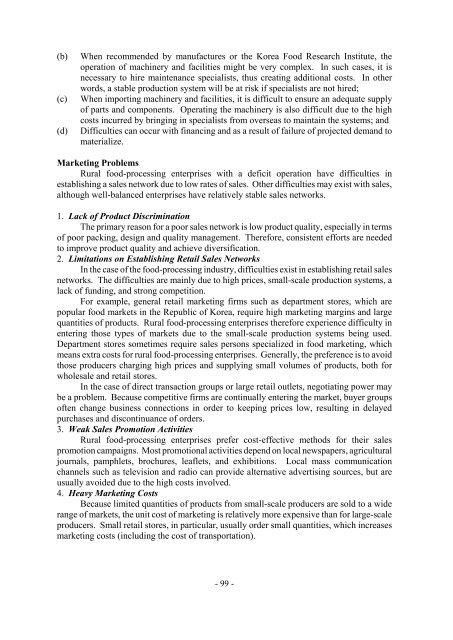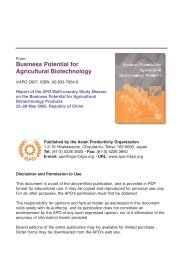Development of Agribusiness Enterprises - Asian Productivity ...
Development of Agribusiness Enterprises - Asian Productivity ...
Development of Agribusiness Enterprises - Asian Productivity ...
Create successful ePaper yourself
Turn your PDF publications into a flip-book with our unique Google optimized e-Paper software.
(b) When recommended by manufactures or the Korea Food Research Institute, the<br />
operation <strong>of</strong> machinery and facilities might be very complex. In such cases, it is<br />
necessary to hire maintenance specialists, thus creating additional costs. In other<br />
words, a stable production system will be at risk if specialists are not hired;<br />
(c) When importing machinery and facilities, it is difficult to ensure an adequate supply<br />
<strong>of</strong> parts and components. Operating the machinery is also difficult due to the high<br />
costs incurred by bringing in specialists from overseas to maintain the systems; and<br />
(d) Difficulties can occur with financing and as a result <strong>of</strong> failure <strong>of</strong> projected demand to<br />
materialize.<br />
Marketing Problems<br />
Rural food-processing enterprises with a deficit operation have difficulties in<br />
establishing a sales network due to low rates <strong>of</strong> sales. Other difficulties may exist with sales,<br />
although well-balanced enterprises have relatively stable sales networks.<br />
1. Lack <strong>of</strong> Product Discrimination<br />
The primary reason for a poor sales network is low product quality, especially in terms<br />
<strong>of</strong> poor packing, design and quality management. Therefore, consistent efforts are needed<br />
to improve product quality and achieve diversification.<br />
2. Limitations on Establishing Retail Sales Networks<br />
In the case <strong>of</strong> the food-processing industry, difficulties exist in establishing retail sales<br />
networks. The difficulties are mainly due to high prices, small-scale production systems, a<br />
lack <strong>of</strong> funding, and strong competition.<br />
For example, general retail marketing firms such as department stores, which are<br />
popular food markets in the Republic <strong>of</strong> Korea, require high marketing margins and large<br />
quantities <strong>of</strong> products. Rural food-processing enterprises therefore experience difficulty in<br />
entering those types <strong>of</strong> markets due to the small-scale production systems being used.<br />
Department stores sometimes require sales persons specialized in food marketing, which<br />
means extra costs for rural food-processing enterprises. Generally, the preference is to avoid<br />
those producers charging high prices and supplying small volumes <strong>of</strong> products, both for<br />
wholesale and retail stores.<br />
In the case <strong>of</strong> direct transaction groups or large retail outlets, negotiating power may<br />
be a problem. Because competitive firms are continually entering the market, buyer groups<br />
<strong>of</strong>ten change business connections in order to keeping prices low, resulting in delayed<br />
purchases and discontinuance <strong>of</strong> orders.<br />
3. Weak Sales Promotion Activities<br />
Rural food-processing enterprises prefer cost-effective methods for their sales<br />
promotion campaigns. Most promotional activities depend on local newspapers, agricultural<br />
journals, pamphlets, brochures, leaflets, and exhibitions. Local mass communication<br />
channels such as television and radio can provide alternative advertising sources, but are<br />
usually avoided due to the high costs involved.<br />
4. Heavy Marketing Costs<br />
Because limited quantities <strong>of</strong> products from small-scale producers are sold to a wide<br />
range <strong>of</strong> markets, the unit cost <strong>of</strong> marketing is relatively more expensive than for large-scale<br />
producers. Small retail stores, in particular, usually order small quantities, which increases<br />
marketing costs (including the cost <strong>of</strong> transportation).<br />
- 99 -
















